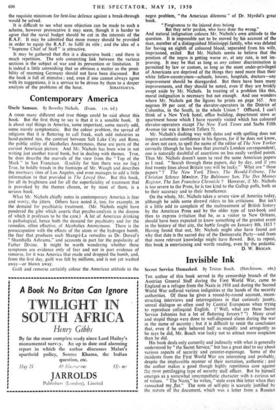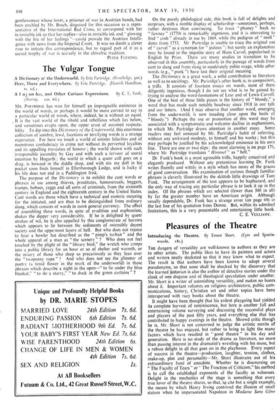Invisible Ink
Secret Service Unmasked. By Tristan Busch. (Hutchinson. 26s.)
THE author of this book served in the censorship branch of the Austrian General Staff during the First World War, came to England as a refugee from the Nazis in 1938 and during the Second World War suffered -various indignities at the hands of the security authorities. Of these he gives a round-by-round account, recon- structing interviews and interrogations in that curiously jaunty, unreal dialogue so often used by Central Europeans when trying to reproduce colloquial English. (" Well, what are these Secret Service Johunies but a lot of flattering farcers ? ") Many cruel and stupid things were done to well-disposed aliens during the war in the name of security ; but it is difficult to resist the conclusion that, even if he only behaved half as stupidly and arrogantly as he says he did, Mr. Busch was lucky not to attract more suspicion than he did.
His book deals only cursorily and indirectly with what is generally understood by " the Secret Service," but has a great deal to say about various aspects of security and counter-espionage. Some of the incidents from the First World War are interesting and probably, despite the implausible manner of their narration, authentic ; and the author makes a good though highly repetitious case against the most pettifogging type of security staff officer. But he himself emerges as a somewhat unsympathetic character with h curious set of values. " The Nazis," he writes, " stole even this letter when they ransacked myillat." The note of self-pity is scarcely justified by the nature of the document, which was a letter from a Russian
gentlewoman whose lover, a prisoner of war in Austrian hands, had been enabled by Mr. Busch, disguised for this occasion as a repre- sentative of the International Red Cross, to correspond with her in invisible ink so that her replies—also in invisible ink and " glowing with the fire of her feelings "—could provide the Austrian Intelli- gence with news from the Imperial Court. It was no doubt a clever ruse to initiate this correspondence, but to regard part of it as a sacred trophy of war is scarcely in the chivalric tradition.
PETER FLEMING.











































 Previous page
Previous page